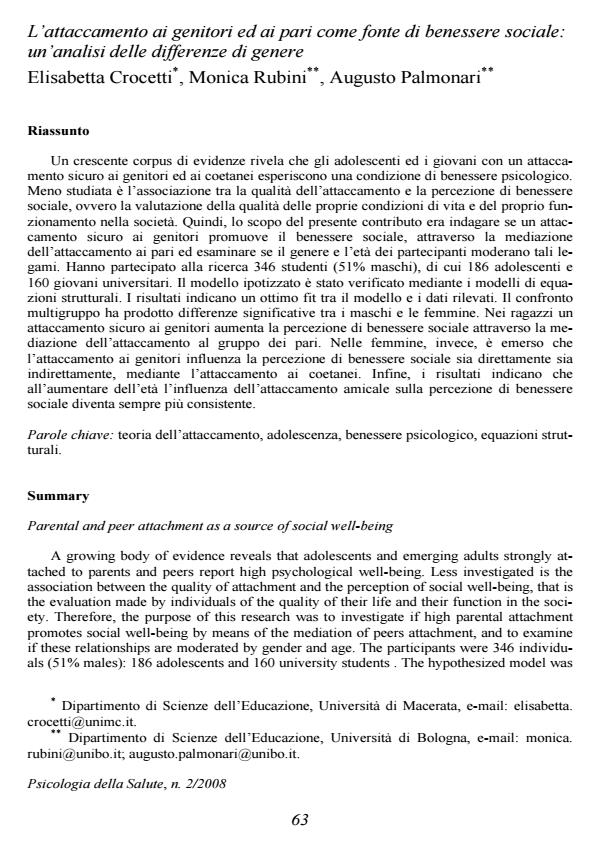L’attaccamento ai genitori ed ai pari come fonte di benessere sociale: un’analisi delle differenze di genere
Titolo Rivista PSICOLOGIA DELLA SALUTE
Autori/Curatori Elisabetta Crocetti, Monica Rubini, Augusto Palmonari
Anno di pubblicazione 2008 Fascicolo 2008/2 Lingua Italiano
Numero pagine 18 P. 63-79 Dimensione file 462 KB
DOI
Il DOI è il codice a barre della proprietà intellettuale: per saperne di più
clicca qui
Qui sotto puoi vedere in anteprima la prima pagina di questo articolo.
Se questo articolo ti interessa, lo puoi acquistare (e scaricare in formato pdf) seguendo le facili indicazioni per acquistare il download credit. Acquista Download Credits per scaricare questo Articolo in formato PDF

FrancoAngeli è membro della Publishers International Linking Association, Inc (PILA)associazione indipendente e non profit per facilitare (attraverso i servizi tecnologici implementati da CrossRef.org) l’accesso degli studiosi ai contenuti digitali nelle pubblicazioni professionali e scientifiche
L’attaccamento ai genitori ed ai pari come fonte di benessere sociale: un’analisi delle differenze di genere - Parental and peer attachment as a source of social well-being A growing body of evidence reveals that adolescents and emerging adults strongly attached to parents and peers report high psychological well-being. Less investigated is the association between the quality of attachment and the perception of social well-being, that is the evaluation made by individuals of the quality of their life and their function in the society. Therefore, the purpose of this research was to investigate if high parental attachment promotes social well-being by means of the mediation of peers attachment, and to examine if these relationships are moderated by gender and age. The participants were 346 individuals (51% males): 186 adolescents and 160 university students . The hypothesized model was tested through structural equation modelling. Findings indicated a very good fit of the model. The multi-group comparison revealed significant differences between boys and girls. In males a good parental attachment promotes social well-being through the mediation of peer attachment. Whereas, in females parental attachment influences social well-being both directly and indirectly, by means of peer attachment. Furthermore, as individuals grew older the influence of the peer attachment on social well-being increased. Key words: attachment theory, adolescence, psychological well-being, structural equation modelling.;
Elisabetta Crocetti, Monica Rubini, Augusto Palmonari, L’attaccamento ai genitori ed ai pari come fonte di benessere sociale: un’analisi delle differenze di genere in "PSICOLOGIA DELLA SALUTE" 2/2008, pp 63-79, DOI: